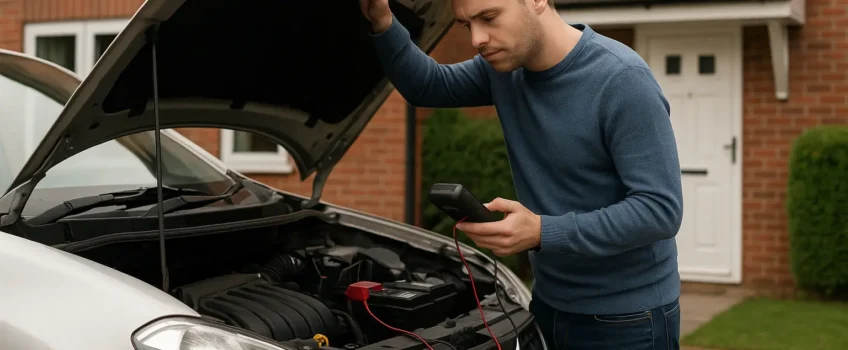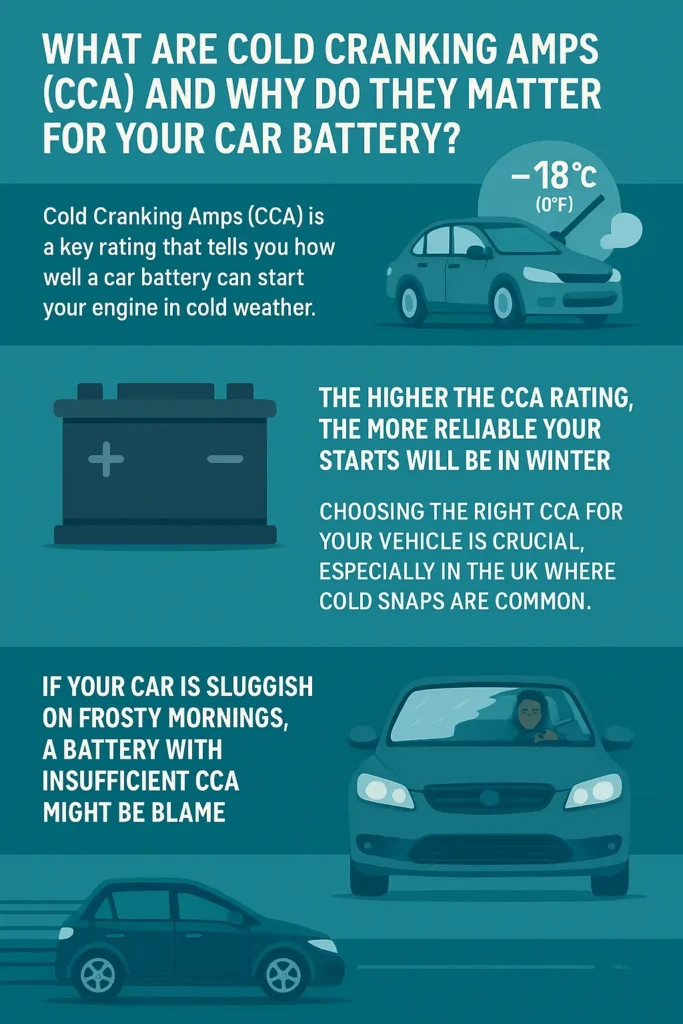
Car Batteries Causing Trouble? Discover Expert Advice from Elite Garages
Most car batteries last 3–5 years, but extreme temperatures, frequent short journeys, or lack of regular servicing can dramatically shorten their lifespan. If your car is struggling to start, your headlights are dimming, or warning lights are flashing on your dashboard, the battery could be on its way out.
At Elite Garages, we know that car batteries are the silent workhorses of your vehicle. Whether you’re driving through Brighton, Bournemouth or Stroud, understanding how your battery works and what to do when it doesn’t. could save you time, stress, and money.
Picture this: you’re rushing to collect the kids from school when your car suddenly won’t start. Or you’re heading to an important meeting and your dashboard lights up like a Christmas tree. We’ve all been there—and it’s often your car battery trying to tell you something.
How Do Car Batteries Actually Work?
Car batteries might seem simple, but they power some of your vehicle’s most essential functions. From starting your engine to keeping the lights, radio and onboard computers running smoothly—your battery delivers a consistent 12 volts to keep everything alive.
Most cars use a lead-acid battery, which relies on chemical reactions to create an electrical charge. Every time you turn the key or press the ignition button, your battery delivers a powerful jolt to get things moving.
But like any component, batteries degrade with time, especially under the strain of hot summers, freezing winters, or frequent short trips.
Why Car Batteries Struggle in Extreme Weather
Both summer and winter conditions are tough on car batteries. Cold weather slows the chemical reaction inside the battery, reducing its ability to hold or deliver power. Meanwhile, high temperatures can cause the fluid inside to evaporate—especially in older batteries.
So if you’ve ever found yourself with a flat battery after a cold snap or a heatwave, you’re not alone. Battery failure is one of the top causes of roadside breakdowns in the UK.
TIP: Book a free battery safety check with Elite Garages before your next heatwave or cold spell.
Warning Signs of Car Batteries You Shouldn’t Ignore
Your car will usually give you clues before the battery gives up entirely. Look out for:
- Slow engine cranking in the morning
- Dim headlights or flickering interior lights
- Clicking noises when trying to start
- Electrical glitches (radio, windows, dashboard malfunctions)
- Illuminated battery warning light
If you notice any of the above, especially in combination, it’s worth getting your battery tested immediately. It might be something as simple as low voltage, or it could indicate the battery is nearing the end of its lifespan.
Car Batteries in Brighton, Bournemouth & Stroud
At Elite Garages, we stock a wide range of high-quality car batteries and offer free, no-obligation checks at our branches in Brighton, Bournemouth, and Stroud. Whether you’re unsure about a recent warning light or just want peace of mind before a long journey, we’ll make sure everything’s working as it should.
Our expert technicians will:
- Test your battery and charging system
- Explain any issues in plain language
- Fit a new battery if required—no pressure, no upselling
Book your check online today or visit us in-store for quick, professional help with your car battery.
Seasonal Battery Advice You Can Trust
Winter:
Cold cranking amps (CCA) drop significantly in colder weather. That means your battery has to work harder to start the engine. If your car is more than three years old, get the battery checked before the temperature dips.
Summer:
Excess heat accelerates corrosion and fluid loss, shortening the lifespan of your battery. Park in the shade where possible, and avoid extended periods of inactivity.
Pro Tip: Don’t just wait for your battery to die. Preventative care is faster, cheaper, and safer.
What Are Cold Cranking Amps (CCA) and Why Do They Matter for Your Car Battery?
Cold Cranking Amps (CCA) is a key rating that tells you how well a car battery can start your engine in cold weather. It measures the battery’s ability to deliver power at –18°C (0°F)—the temperature where many batteries struggle most. The higher the CCA rating, the more reliable your starts will be in winter. Choosing the right CCA for your vehicle is crucial, especially in the UK where cold snaps are common. If your car is sluggish on frosty mornings, a battery with insufficient CCA might be to blame.
Cambelt Services in Fareham – A Related Essential
While you’re thinking about under-the-bonnet care, don’t forget your cambelt. At our Fareham branch, Elite offers trusted cambelt replacement services to help you avoid costly engine damage.
Cambelts typically need replacing between 60,000 to 100,000 miles depending on your vehicle. Let our trained technicians inspect yours during your next visit.
MOT-Ready? Don’t Let Car Batteries Result in Failure
A weak or faulty battery could lead to a failed MOT—especially if it’s causing electrical errors or dashboard lights to flash. Be proactive. A free vehicle safety check can help you catch issues in advance.
EVs and Car Batteries – What’s Different?
While electric vehicles (EVs) rely on large lithium-ion batteries for propulsion, they also have a standard 12V battery that controls things like lighting, infotainment and locks.
If you’re an EV owner, regular battery health checks remain essential—particularly if the car is parked for extended periods or charging irregularly.
Visit our Caterham branch for dedicated EV servicing with certified technicians and cutting-edge diagnostics.
Year-Round Vehicle Maintenance Services
Car battery care is just one piece of the puzzle. To keep your car roadworthy and comfortable, Elite Garages also provides:
- ADAS Calibration: Ensure your vehicle’s safety features function correctly.
- Wheel Alignment: Prevent uneven tyre wear and boost handling.
- Tyre Safety Checks: Free checks to keep you safer on the road.
- Car Diagnostics: Identify and fix faults before they become expensive problems.
Final Thought on Car Batteries: Stay Ahead of Trouble
From car batteries in Brighton to Bournemouth car batteries and car batteries in Stroud, Elite Garages is your trusted expert in keeping your car moving. If your vehicle refuses to start, especially on cold mornings, your battery might be the culprit. While prevention is best, it’s worth knowing how to safely start a car with a flat battery in an emergency.
We offer free checks, affordable replacements, and straight-talking service across the south of England. Don’t wait for a breakdown—book a visit today and drive with confidence all year round. Read this guide for help choosing the right car battery.
FAQs
Click the + to read any answer or visit our most FAQ page to review the most frequently asked questions across all our Elite Locations.
If you click on a ‘Category’ or ‘Tag’ link, the page will ‘refresh’ and reload the page showing the top of the page first, you’ll then just need to scroll down to the FAQ section to see the results for the Category or Tag you selected.
The cost of replacing a car battery in the UK ranges from £100 to £400, depending on various factors such as size, type, brand, quality, and warranty. It’s best to contact your nearest Elite Garages to find out more about different types and the cost as the price can vary, especially when it comes to electric vehicles and hybrids.
To determine the appropriate size of car battery for your vehicle, you will need to consider a few factors such as the make, model, and year of your car. The most reliable way to identify the correct battery size is to consult your vehicle’s owner’s manual or check the specifications provided by the manufacturer. The owner’s manual usually contains information about the recommended battery group size or specific Cold Cranking Amps (CCA) requirement for your car.
When it comes to car batteries, the longevity can vary depending on various factors such as usage patterns, climate conditions, and maintenance practices. However, some types of car batteries are generally known for their longer lifespan. Here are a few types with an average estimation:
- Lead-Acid Batteries: 3 to 5 years
- Lithium-Ion Batteries: 3 to 10 years
- Nickel-Metal Hydride Batteries: 3 to 10 years
- Absorbed glass mat batteries (AGM): 3 to 6 years
- Deep cycle batteries: Up to 8 years
About Us
Opening Times
Saturday : 8:30–4:00
Sunday : closed
More Information
Contact UsCustomer Information Pack
Check MOT Due Date
Free MOT reminder
Careers
Legal Information
Recent Posts
- Regular Car Maintenance: Joe Achilles Tests Elite Garages’ 250,000-Mile BMW
- Clutch Replacement Near Me: A Comprehensive Guide for UK Drivers
- Antifreeze Coolant: What It Is, How It Works, and When to Use It
- MOT in Brighton: Your Essential Guide to Testing, Servicing and Tyre Safety
- Uneven Tyre Wear Explained: Is It Time for a Wheel Alignment Service?



